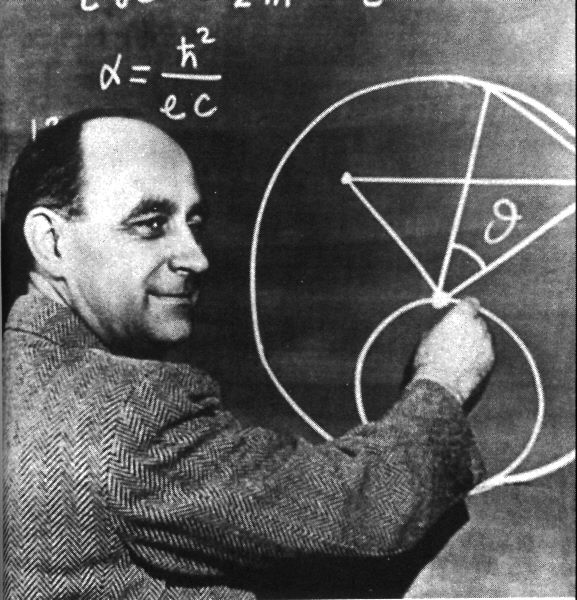The year was 1939 and the month was March, as in Beware of the Ides of. His arrival at the Navy Department in Washington, D.C., was unceremoniously announced by the desk officer, who informed Admiral S.C. Hooper, United States Navy, "There's a wop outside."
Said person, one Enrico Fermi, had just collected a Nobel Prize en route to political asylum in this country from Italy, complete with his Jewish wife, Laura. If she and her family were persona non grata in Herr Hitler's Reich, he would be more than welcome, and more than useful in this land of the free and still home of the brave.
Enrico Fermi's theoretical physics had given Il Duce the one chance he had to make Italy -- Italy! -- a nuclear power as early as the 1930s. But it was really the Nazis whom he and more politically aware Americans in general were out to out-race to the Bomb.
Enrico Fermi's efforts for his Italian homeland might have resulted only in a grand failure like all Werner Heisenberg's efforts to produce the Bomb for Germany, but who knows? Anything is possible in the strange world of quantum physics and alternate universes. But this caller at the Navy Department came armed with his own steely nerves and complete confidence in his own then only theoretical but sure work.
Enrico Fermi seemed surprisingly unpretentious in a world of prima donnas. As his daughter Nella put it, "It wasn't that he lacked emotions, but that he lacked the ability to express them." Or pretended to. Maybe had been taught to suppress his nature by his mother, who brooked no nonsense and informed him: "In this home naughty boys are not tolerated." Any more than he would tolerate star turns by others. He would lose a beloved older brother young, and suffer many another wound in childhood, but they seemed to make him only stronger, if more solitary.
And so it was that Fermi armed himself with a letter to President Roosevelt which would prove the beginning of the now famous Manhattan Project, which would result in the world's first nuclear reaction. Brick by brick, all carefully assembled in a University of Chicago squash court. Talk about tension, he never showed it. In a couple of weeks toward the end of 1942, Fermi and Co. would oversee the controlled nuclear reaction they had initiated. Ever so calmly, ever so effectively. Uranium no longer held any secrets from him and his careful colleagues.
To cite a recent biography titled "The Pope of Physics" (by Gino Segre and Bettina Hoerlin, Henry Holt, 351 pages, $30), Fermi became an expert at standing out without standing out. He could outplay even himself at this all-important game. As early as 1933, Hitler's first year as Reich chancellor, this experimental scientist had already determined the Fuehrer's fate. Yet he said not a word to anyone about it, for he understood the meaning of another most important term in a way this year's presidential candidates don't: Top Secret.
Comment by clicking here.
Paul Greenberg is the Pulitzer-winning editorial page editor of the Arkansas Democrat-Gazette.



 Contact The Editor
Contact The Editor
 Articles By This Author
Articles By This Author
